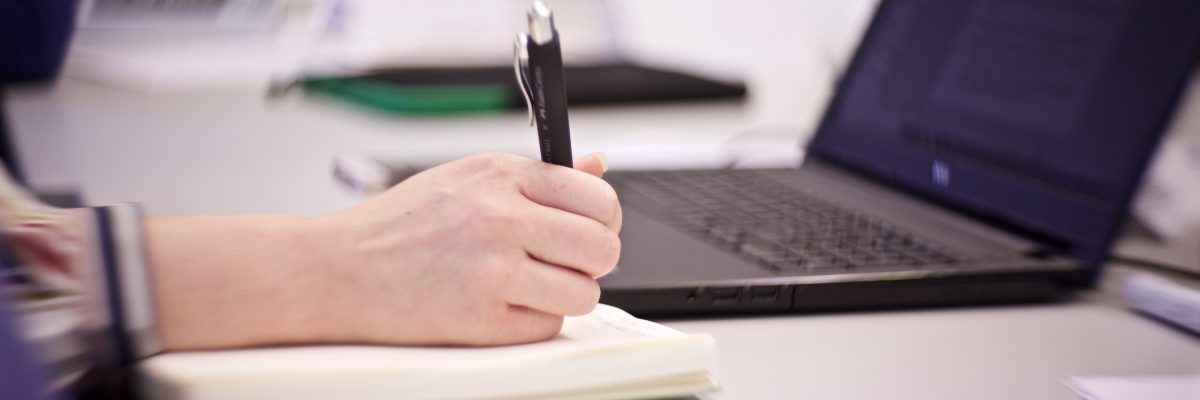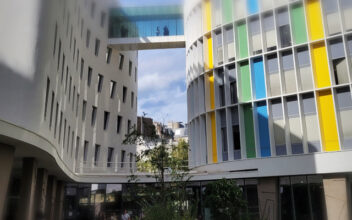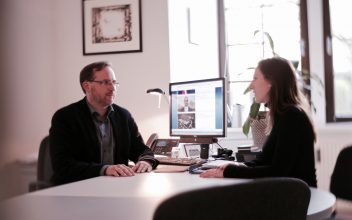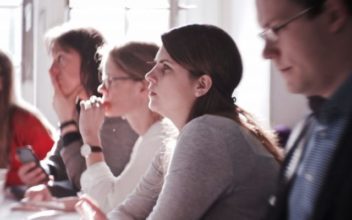
Journalism for the European Idea – the German-French Master of Transnational Journalism
With our transnational master’s program, we transcend borders – geographically and journalistically. Together with the Université de Paris III – Sorbonne Nouvelle and the Franco-German University (DFH), students are prepared for professional practice in a Europe that is growing together. Participants study one year in Mainz and one year in Paris. The courses are offered in German, French and English, and the journalistic and academic perspective is transnational rather than national. The program is open to applicants from all fields of study with very good language skills.
Module 1: Printjournalism in France and Germany (Paris)
The content of this module consists of fundamentals and current trends of press journalism of agencies, newspapers, magazines and journals in France and Germany. You will learn to research, write and edit the basic journalistic forms of presentation in French and German, gain comparative insights into the practice of journalism in France and Germany and be taught journalistic quality criteria as well as the ability to deal with questions of media ethics. The most relevant strategies and techniques of press journalism of magazines and journals, including researching and writing the specific forms of presentation, are practiced and journalistic text contributions are produced in both languages. The examination of theoretical and practical aspects of the work of foreign correspondents is also part of the module.
After these courses you will be able to apply theoretical, ethical and practical basic knowledge of journalistic work, to describe and differentiate between strategies and techniques of press journalism of agencies and newspapers as well as of magazines and journals, to apply in French as well as in German basic interviewing, researching and writing techniques for agencies and newspapers as well as basic knowledge of researching, writing and designing large reports, portraits and features for magazines and journals under realistic conditions in practice. In addition, you will have mastered the various journalistic text types in both German and French-language press journalism and will be able to independently produce these, as well as text contributions in the field of cultural journalism. Finally, you will be familiar with the work of foreign correspondents, both theoretically and practically.
This module marks the start of every participant's studies in this field and is taken at the Université de Paris III Sorbonne Nouvelle.
Module 2: Forms of Presentation in Print Journalism (Mainz)
The content of Module 2 consists of the basics and current trends in text-oriented journalism and its various forms of presentation, as well as basic principles for designing the layout of newspapers and magazines. Here, too, students will learn how to research, write and edit the basic journalistic forms of presentation (such as news, reports, interviews, commentaries, glosses, portraits, reports, features, headlines and small texts) and receive targeted research, interview, writing, editing and layout exercises. In addition, students will gain insight into the practice of print journalism, the criteria for journalistic quality in text-oriented journalism, journalistic diligence and media ethical approaches.
After these courses, you will be able to distinguish between the different text-oriented forms of presentation; to assess their suitability for different media, topics and forms of presentation, or for specific journalistic approaches; to select, apply and reflect on interviewing, researching, editing and writing techniques relevant to the various forms of presentation under realistic conditions; and to apply basic knowledge of researching, writing and designing news and commentary texts as well as large reports, portraits and features in practice. Overall, these courses will enable you to independently create a press product based on professional criteria.
This module is completed at the Johannes Gutenberg University Mainz.
Module 3: Television Journalism (Paris/ Mainz)
In terms of content, Module 3, Television Journalism, deals with the theoretical foundations for practical audio-visual and television journalistic work. You will receive an overview of the various means and forms of presentation in audio-visual and television journalism as well as an overview of current trends and innovative developments. Learning and practicing the basic knowledge and working techniques for audio-visual and television journalistic formats is the focus of this module. You will also receive an introduction to the design and technical execution of audio-visual and television journalistic products in German and in French, with a special focus on transnational topics.
The courses in Module 3 will provide you with basic knowledge of the production techniques of audio-visual journalism and television: starting with still-image press photography, news formats, mobile reporting and smaller forms of presentation, for example for journalistic social media content, through to longer contributions with professional equipment for different formats within the framework of a linear and non-linear journalistic content. You will also gain an overview of current trends and innovative developments in the continuously changing area of journalism. Finally, you will be able to apply the acquired knowledge and master the different means and forms of presentation of audio-visual journalism specifically for the German and French markets.
This module is completed at both partner universities.
Module 4: Radio Journalism (Paris/ Mainz)
The module on radio journalism provides an overview of the theory and practice of auditory journalistic publications and formats, their fundamentals and production conditions in linear and non-linear radio as well as on the web in Germany and in France. In this module you will expand your knowledge of the organizational and technical requirements and working methods of radio editorial offices, receive training in the theory and practice of digital audio editing, and broaden your understanding of the respective technical language in Germany and France. This module also focuses on the practice of simple to complex forms of presentation for contemporary audio journalism as well as the teaching and practice of radio-specific speech, moderation and interview techniques.
In these courses, you will acquire basic knowledge of means of presentation, forms of presentation and production techniques of radio, radio journalism and other auditory journalistic forms of publication (podcasts, etc.). In addition, these courses will enable you to apply the basic knowledge you have acquired and to implement the various means of presentation and forms of presentation for auditory journalistic formats in practice in a differentiated manner for Germany and France. This includes radio-specific speech techniques as well as the production of a radio broadcast, including recording techniques.
This module is completed at both partner universities.
Module 5: Online and Multimedia Journalism (Paris/ Mainz)
In Module 5, Online and Multimedia Journalism, students will learn the basics of journalistic work for the web with text, images, sound and graphics: Topic selection, screen design, user experience, control of navigation and reading behaviour, specific text, sound, image and film design including mobile reporting, the use of content management systems, cross-media work, image and sound design for the web, target-group-related research, production and implementation of topics form the focus of the basic teaching. The module also focuses on data journalism, fact-checking, specific contexts of online journalism in Germany and France, and online journalism in German and French. Part of the module will be the independent production of your own bilingual blog on transnational topics.
Through the courses in this module, you will gain basic knowledge in journalistic work for the web with text, images, sound and graphics. This includes learning about the technical conditions, possibilities and restrictions of publishing on the web, screen design, user experience, controlling navigation and reading behaviour, and specific text, sound, image and film design for journalistic online publications. You will learn how to use content management systems and be able to apply them in the journalistic practice. In addition, you will be able to implement topics in multimedia with appropriate journalistic quality for specific target groups and market them with suitable strategies, as well as analyse user behaviour with web statistical data and use this for your work. You will understand how to verify information using fact-checking methods, how to deal with fake news appropriately and how to use data journalistically, as well as how to express yourself in and understand technical language.
This module is taken at both partner universities.
Modul 6: Regional- and Media Studies (Paris)
This module focuses on the presentation and contextualization of current media policy issues in Germany and France. The history of the media after World War II in Germany and France as well as the economic structure and ownership of the media are the focal points of the courses. This module also focuses on media markets, governmental frameworks and the basic concepts of media law in both countries, the particularities of the respective public broadcasting systems as well as journalistic culture, and transnational phenomena and transfers in the media sector.
In this module, you will decode cultural and linguistic spaces by engaging with the two partner countries on an academic and country-specific level. As a future bilingual journalist, you will be able to better understand and explain the topicality of the two countries. The focus will not only be on the societal, economic and social systems, but also on the media landscapes of both countries in contrast and in their relation to the global media landscape. Knowledge of the economic structures and ownership of the media, as well as their governmental and legal frameworks, should enable you to assess current and future developments and decisions in media policy and media economics, to evaluate their influence on journalistic work in perspective, and to identify, compare and optimally navigate the respective journalistic cultures.
This module is taken at the Université de Paris III Sorbonne Nouvelle.
Modul 7: Foreign Languages and Methods (Paris/ Mainz)
In this module, you will learn about research methods or philosophy of science, deal specifically with the methods of media and communication research and work out relevant content on a scientific basis. Another focus in this module is your language competence; you will be taught in German or French, attend a course on media English and deepen your language skills in language courses on the respective foreign language (German or French).
In terms of content, the focus of this module is on language and specialized language courses: the emphasis is on expanding vocabulary, repeating selected chapters of French or German grammar, and training written and oral language skills in three languages (German, French, English). This will be also studied in the language context of journalism, media and communication science. You will also deepen your knowledge in methods courses: An introduction to research methods in general is part of the module, as well as attending lecture series by international researchers on methods of media and communication research.
This module is taken at both partner universities.
Modul 8: Transnational Reflection (Paris/ Mainz)
This module offers courses on contemporary history, cultural studies and political science, as well as a focus on journalism and integration in a European context. In addition, the history and development of media research and media in a global context will be considered, and a practice-based project paper on transnational journalism will be completed. As a journalist who will be researching, reporting and arguing transnationally in the future, you will be able to recognize overall contexts, to integrate developments and events from individual national sub-areas into a transnational or even global context and to prepare these for the audience in an understandable and informative way. Particularly in the case of topics of European relevance, you should overcome national patterns of interpretation in your reporting and transfer the corresponding discussions into national contexts as well as offer the recipients interpretative frameworks that point beyond their own borders. In addition, you will learn to reduce the complexity of European contexts appropriately, to integrate them into national discourses and thus to bring topics of transnational relevance, such as migration and integration, environmental and climate protection, political cooperation and digitization, into the public discourse. In this module, you will also gain in-depth knowledge of the institutional and political foundations as well as the current policies of the EU and their implications.
This module is taken at both partner universities.
Modul 9: Editorial internships (Frankreich/ Deutschland)
You will try out the knowledge you have learned in professional practice, get to know the working practice in editorial offices and production teams, and gain insights into the process of finding journalistic topics. To enable you to do this in the media of both countries and in both languages, the first internship takes place during the first year of study and thus in the country of the university where you started. The second internship takes place during the second year of study and thus in the country of the partner university.
During the internships, you will usually be involved in editorial processes. You will suggest topics, do research and write or produce your own articles in both languages. Depending on your level within the program, internships are planned at news agencies, newspaper and magazine editorial offices, online editorial offices, radio or television editorial offices, or at companies that produce journalistic content. Particular value is placed on such editorial work where transnational topics not only have to be processed, but also researched.
In these courses you will acquire basic knowledge of means of presentation, forms of presentation and production techniques of radio, radio journalistic work and other auditory journalistic forms of publication (podcasts, etc.). In addition, these courses enable you to apply the basic knowledge you have acquired and to implement the various means of presentation and forms of presentation for auditory journalistic formats in practice in a differentiated manner for Germany and France. This includes radio-specific speech techniques as well as the production of a radio broadcast, including recording techniques.
This module is completed at both partner universities.
Modul 10: Masters's examination (Paris/ Mainz)
In the master’s thesis, you will demonstrate both your practical journalistic skills and your ability to critically reflect on and scientifically examine the role and significance of the media as part of public discourse. You will prove capable of recognizing topics of transnational importance in their overall context as well as of preparing developments and events from individual sub-areas in a transnational context in a comprehensible and informative way for the audience. In addition, you will show that you are able to reduce the complexity of European contexts in an appropriate manner and transfer them into national discourses. In a comprehensive journalistic assignment in the field of print, radio, television or online/multimedia, you will demonstrate that you are able to apply the methods and expertise you have acquired within a specified period of time.
The master’s thesis combines science and practice in a binational and bilingual examination paper that is jointly supervised by the two partner universities. It comprises a theoretical-scientific and a practical-journalistic part. If you start your studies in Mainz, the theoretical-scientific part is written in German in the 2nd semester at JGU and the practical-journalistic part is written in French in the 4th semester at the Université de la Sorbonne Nouvelle – Paris 3. The first, theoretical and the second, practical part of the master’s thesis are related in terms of content and build upon each other. The representatives for your specific subject in Mainz and Paris will suggest suitable teachers for the supervision of the Master’s theses. The topics for the two parts of the Master’s thesis are determined by the supervisors in consultation with you.
This module is completed at both partner universities


